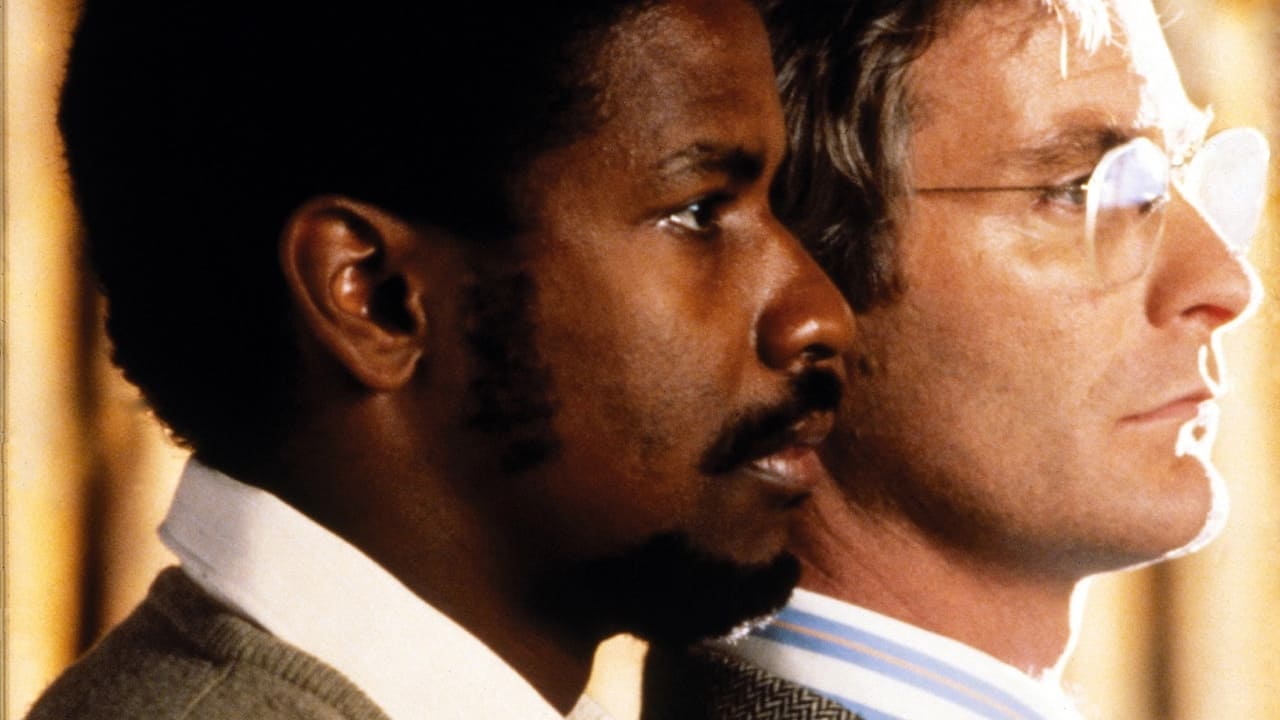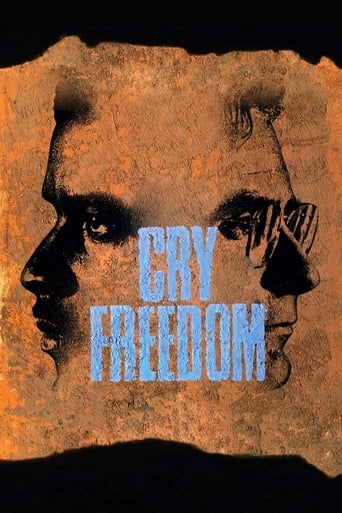

Fanciful, disturbing, and wildly original, it announces the arrival of a fresh, bold voice in American cinema.
... View MoreA film with more than the usual spoiler issues. Talking about it in any detail feels akin to handing you a gift-wrapped present and saying, "I hope you like it -- It's a thriller about a diabolical secret experiment."
... View MoreThe thing I enjoyed most about the film is the fact that it doesn't shy away from being a super-sized-cliche;
... View MoreExactly the movie you think it is, but not the movie you want it to be.
... View MoreBased on the books "Biko" and "Asking for Trouble" by its protagonist Donald Woods, this is an extremely good film which tells the story of the Daily Dispatch editor's friendship with the murdered Black Consciousness leader Steve Biko and their struggles against apartheid. Having previously taken on the British establishment in "Oh! What a Lovely War", "A Bridge Too Far" and "Gandhi", Richard Attenborough turned his attention to the far more pernicious and destructive South African establishment of the time. His direction is as assured as ever and the script by "Gandhi" screenwriter John Briley is strong but the film's second half is slightly lacking when compared to the first. While it is not the first film that I have seen dealing with apartheid, it is the first that was made while it still existed so that was very interesting. As far as I am aware, the film is very historically accurate, which I appreciated.Kevin Kline is extremely strong as Donald Woods, a liberal South African journalist who comes to Biko's attention when he accuses the Black Consciousness Movement of advocating racism. After meeting him, however, he comes to appreciate that Biko is advocating equality and, contrary to the fears of many conservative Afrikaners, has no desire to create a system in which blacks would oppress whites in the same manner as they are themselves oppressed. Like Gandhi and Martin Luther King, he advocates non-violence to achieve his political aims. Woods, who served as an adviser on the film, learns over the course of the film that the regime is even worse than he thought. After Biko is murdered, he is determined that justice be done, something which leads him to be banned and essentially placed under house arrest. The final straw comes when the Security Police sends his children T-Shirts laced with acid. He decides to leave South Africa for his and his family's safety. After 15 years, Woods returned home in 1994 to vote in the first democratic election. He died in 2001.In one of his first major film appearances, Denzel Washington is fantastic as Steve Biko, a performance which deservedly earned him a Best Supporting Actor nomination. Biko is a highly intelligent, principled and courageous man whose fierce intelligence is underestimated by the regime because of the colour of his skin. He has a perfectly logical and reasoned answer to every question whether in conversation or in court and there is nothing that he says in the film that I found any reason to disagree with even slightly. One of the best illustrations of this is when he says that a black child is doomed in live in the shanty towns on the outskirts of society irrespective of how intelligent he or she is whereas white children have considerably more opportunities. Biko is murdered about 80 minutes into the film and it is never as strong after his death. I think that it could have been better structured and included more scenes of him before he had to be killed.As is typical of Attenborough's films, the film has a very strong supporting cast, most notably Penelope Wilton as Woods' wife Wendy (though she does not have a South African accent) and Josette Simon as Dr. Mamphela Ramphele. However, I was slightly disappointed that Mamphela did not have a bigger role in the film as she seemed to be introduced with much fanfare and then simply disappeared soon after Biko's death. In real life, she was having an affair with Biko and had two children with him and a third on the way when he died but this is left out of the film, which is a shame as he could have made for an interesting subplot. As with the two "Roots" miniseries, I thought that it was a great idea to cast well known white actors with generally likable screen personas in antagonistic roles such as John Thaw as the Minister of Justice Jimmy Kruger (who died only six months before the film was released), Timothy West as Captain de Wet and Ian Richardson as the State Prosecutor. Conversely, Julian Glover is cast against his usual villainous type as Woods' friend Don Card. The film also features great appearances from Zakes Mokae (who has the largest role of any actual South African), Kevin McNally, Kate Hardie, Alec McCowen, Louis Mahoney, Joseph Marcell and Attenborough's brother-in-law Gerald Sim as the police doctor who examines the dying Biko. One actor whom I thought was conspicuous by his absence was the prominent anti-apartheid activist and playwright Athol Fugard, who previously played General Smuts in "Gandhi".At more than two and a half hours, the film is a tad too long and it focuses too much on the Woods family's escape from South Africa. While an accurate depiction of their escape and good scenes in their own right, they could have easily been shortened. After a while, it began to feel more like an adventure film and this did not fit terribly well with the rest of the film. There were also not enough scenes of the regime discriminating against black South Africans in the second half (in stark contrast to the first) for my liking. Given the time, the film was shot in Zimbabwe rather than South Africa itself and Attenborough made excellent use of that country's scenery. The Soweto massacre is depicted in flashback towards the end of the film but I felt that it would have been better to place it in its proper place chronologically speaking and to give it more prominence as the scene could have been as effective and moving as the depiction of the similar Amritsar massacre in "Gandhi".Overall, this is a very entertaining and thought provoking film but it is never as engrossing as it should be after Biko's death. It is a powerful statement against racism but it could have been even more so with slightly sharper writing.
... View MoreDonald Woods (Kevin Kline) is the editor of the liberal South African newspaper Daily Dispatch. His editorial criticizes Steve Biko (Denzel Washington) for being a black racist. Dr. Ramphele confronts him and brings him to Biko. Biko is banned and is followed everywhere by the security forces. He is fighting for black empowerment. Woods is impressed and befriends him. Biko is killed in police custody. Woods is also banned and must escape South Africa.I like the gritty street life. I like Denzel as Biko. The danger for these types of movies is to sideline quickly the black story for the white protagonist. Spoilers ... Biko does die before halfway into the movie. However, Woods is able to pick up the fight and essentially carry the spirit of Biko with him. What I truly like about Woods is that he's a well-informed smart guy. We don't have to have the shocked ignorant white man discovering black people. His initial disagreement with Biko is sincere and a reasonable argument. It keeps the movie smart and not fall too hard into the usual movie trope.
... View MoreCry Freedom is a powerful drama that focuses on the South African apartheid and the unlikely relationship that a black leader and a white liberal journalist formed. The movie itself is well-done, but my only complaint is that I wanted to see more Steve Biko who was the black leader. He had powerful, mesmerizing words and those words lifted this film to new heights.Richard Attenborough's film is not only about the special relationship Biko and Donald Woods formed, but how Woods escaped South Africa so he can publish a book that will tell the world about Biko.The acting is very good. Denzel Washington, in one of his early screen roles, took up the screen whenever he was on it. He was very captivating and memorable. I would have loved to seen more of him. Kevin Kline is really good as Woods, but sometimes I feel like this movie is about him rather than Biko.Overall, this is a powerful film that will deeply touch your heart. It's a moving film about one country's struggles against apartheid and how they cried to the world for help. The music in the film by George Fenton adds more to this movie and makes it even better. This is a drama that one should see. I rate this film 9/10.
... View MoreWhat is "Cry Freedom" like? It is simply great and unique experience about making of South Africa and how black people in that country were repressed by white people. Main character of the story is Donald Woods (Kevin Kline), chief editor of the newspaper Daily Dispatch in South Africa. Woods writes several articles, where he speaks critically about views of Steve Biko (Denzel Washington). Soon Woods meets Biko and he changes his views about him and he also begins to understand what authorities are doing to black people in South Africa (right from the top, even from the chief of police). When Biko dies in police custody, Woods decides that he have to write book about him and that no matter what he has to publish it. But Woods must escape from his country to get that book published and he must also put his family on second place, so world can find out the truth.Attenborough managed to make a good movie about people, with main message that black and white are the same, cause we are all people. Story leads us to South Africa and this (movie) is great way for the whole world to learn what happened in that land and I'm disappointed that only 3200 people rated this movie. This is movie from which we all can learn something. Although it is a bit long, this story couldn't be presented in any shorter way because director wanted to show us how hard was for Woods to get that book published after death of Biko. Also relationship between Woods and Biko was shown great, just like families of those two people and all the problems they are going through. But sometimes sacrifices must be made (Biko's death) so the truth could be reveled (Woods book).
... View More